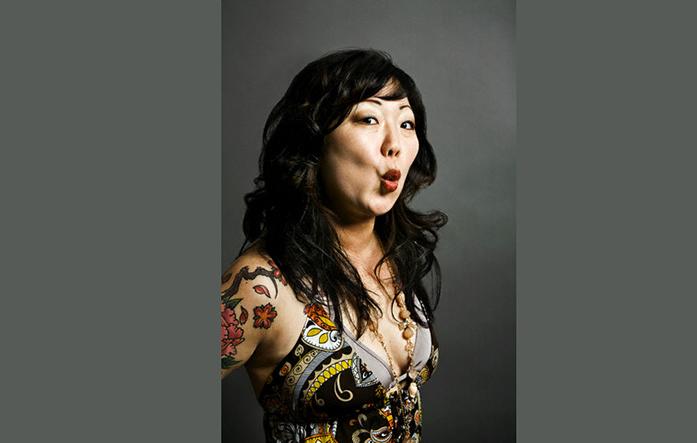By Brett Shaw
Famed comedian Margaret Cho unapologetically embraces her intersecting identities and frequently raises controversy with her outspoken beliefs. Through an eclectic career in entertainment, complete with a couple of Grammy-nominated comedy albums, and various philanthropic efforts, she is a champion of pioneering diversity.
“I am so many identities: queer, Asian, feminist,” Cho said. “I try to push all these boundaries of identity with class. And trash.”Cho will display her vibrant and on-the-edge humor as part of Mission Creek Festival at 7:30 p.m. Thursday at the Englert, 221 E Washington St.
Along with her personal identities, growing up in a diverse San Francisco neighborhood exposed her to lifestyles and cultures such as drag queens, hippies, burnouts, and others who helped shape her inclusive and socially dynamic beliefs.
Cho is very politically active, both in her show material and daily life. Her celebration of gay culture and her political advocacy for LGBTQ rights have made her an icon. Iowa City Pride and Studio 13, two significant organizations in Iowa City’s LGBTQ community, are even co-presenting Cho’s performance.
As a queer woman and self-proclaimed “fag hag,” Cho has led several campaigns to legalize same-sex marriage, stirred controversy with a pride-theme dress on Dancing with the Stars, and received a Lifetime Achievement Award from PFLAG and LA pride for leaving a lasting imprint on the LGBTQ community.
Cho believes that art is intrinsically political and enjoys partaking in the discussion through comedy and activism.
“I started doing shows during the AIDS crisis and under the Reagan administration,” she said. “There was a lot to say and there still is now.”
Cho has also served as a pioneer for Asian Americans in comedy and entertainment. Her 1994 ABC sitcom “All-American Girl” was the first television show in history to center on an East Asian family. The show was soon canceled after poor reviews; however, Cho set a foundation for future Asian representation in televised media.
Being a successful woman in comedy, an industry that is overwhelming male, is a feat in itself. Female comics are held to different standards and criticisms from their male counterparts. Following “All-American Girl,” Cho was subject to tormenting ridicule over her weight, appearance, and ethnicity, which led her to various self-abusive behaviors.
However, she pulled herself out of the dark space and regained her confidence. Her hit 1999 one-woman play and book, I’m the One That I Want, astounded audiences with her depicted struggles and triumphs in the entertainment industry. In 2003, she received the Intrepid Award from the National Organization of Women.
Cho’s work has often met with controversy. Whether it be inflammatory terminology on stage or a portrayal of a North Korean general at the Golden Globes, her comedy tends to teeter the line between taboo and offensive.
“I think it’s hilarious to be offensive,” she said. “I don’t find it offensive at all, though.”
Sex is brought to the forefront of many of Cho’s jokes, sparking an extremely open and frequently vulgar dialogue. Whether frankly discussing her ability to orgasm or partaking in a musical diss track titled “My Puss,” her content embraces and even celebrates risque sexuality.
“I’m from the ’90s pansexual renaissance,” she said. “It’s a time when we tried to make sense of sex; AIDS changed the landscape of our community, and we were making safer sex fun.”
By including lewd humor and covering sexual topics, Cho normalizes raunchiness and makes the discussion of safe sex casual and entertaining.



